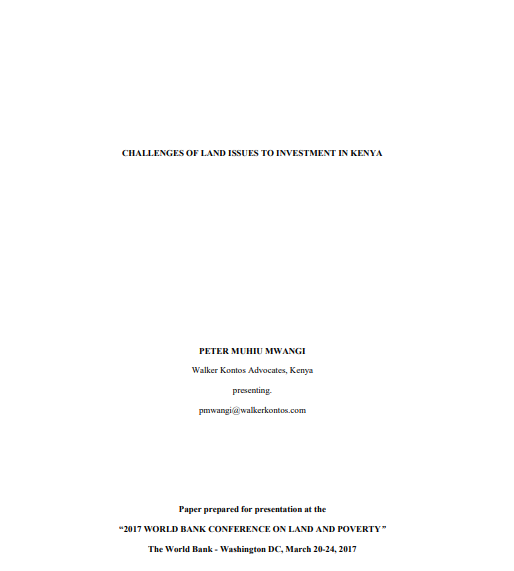The World Bank is a vital source of financial and technical assistance to developing countries around the world. We are not a bank in the ordinary sense but a unique partnership to reduce poverty and support development. The World Bank Group has two ambitious goals: End extreme poverty within a generation and boost shared prosperity.
- To end extreme poverty, the Bank's goal is to decrease the percentage of people living on less than $1.25 a day to no more than 3% by 2030.
- To promote shared prosperity, the goal is to promote income growth of the bottom 40% of the population in each country.
The World Bank Group comprises five institutions managed by their member countries.
The World Bank Group and Land: Working to protect the rights of existing land users and to help secure benefits for smallholder farmers
The World Bank (IBRD and IDA) interacts primarily with governments to increase agricultural productivity, strengthen land tenure policies and improve land governance. More than 90% of the World Bank’s agriculture portfolio focuses on the productivity and access to markets by small holder farmers. Ten percent of our projects focus on the governance of land tenure.
Similarly, investments by the International Finance Corporation (IFC), the World Bank Group’s private sector arm, including those in larger scale enterprises, overwhelmingly support smallholder farmers through improved access to finance, inputs and markets, and as direct suppliers. IFC invests in environmentally and socially sustainable private enterprises in all parts of the value chain (inputs such as irrigation and fertilizers, primary production, processing, transport and storage, traders, and risk management facilities including weather/crop insurance, warehouse financing, etc
For more information, visit the World Bank Group and land and food security (https://www.worldbank.org/en/topic/agriculture/brief/land-and-food-security1
Resources
Displaying 186 - 190 of 49073 - Choosing Appropriate Business Models - Responsible Agricultural Investment (RAI): Knowledge into Action Notes series
This note is part of an Action Notes series and provides guidance for governments and companies on how to design business models for responsible agricultural investment. It outlines the general types of models available and the considerations for selecting and/or designing a blended model to suit the context of the investment.
3 - Choosing Appropriate Business Models - Responsible Agricultural Investment (RAI): Knowledge into Action Notes series
This note is part of an Action Notes series and provides guidance for governments and companies on how to design business models for responsible agricultural investment. It outlines the general types of models available and the considerations for selecting and/or designing a blended model to suit the context of the investment.
3 - Choosing Appropriate Business Models - Responsible Agricultural Investment (RAI): Knowledge into Action Notes series
This note is part of an Action Notes series and provides guidance for governments and companies on how to design business models for responsible agricultural investment. It outlines the general types of models available and the considerations for selecting and/or designing a blended model to suit the context of the investment.
CHALLENGES OF LAND ISSUES TO INVESTMENT IN KENYA
The last decade has witnessed a raft of political and legal reforms in Kenya and the efforts have paid dividends. Kenya is experiencing an unprecedented surge in foreign direct investments in varied infrastructure projects. In most cases the projects are situate in rural areas creating a buzz of excitement and igniting opportunities for poverty reduction initiatives directly or indirectly.
LAND TENURE AND ITS IMPACTS ON FOOD SECURITY IN UGANDA
The need to establish the link between land tenure and food security is increasingly gaining currency as governments and development organizations refocus their effort towards assisting farmers to move away from subsistence farming to commercial agriculture. It is argued that given how land plays a crucial role in the livelihoods of most Africans, food security and poverty reduction cannot be achieved unless issues of access to land, security of tenure and the capacity to use land productively and in a sustainable manner are addressed.








